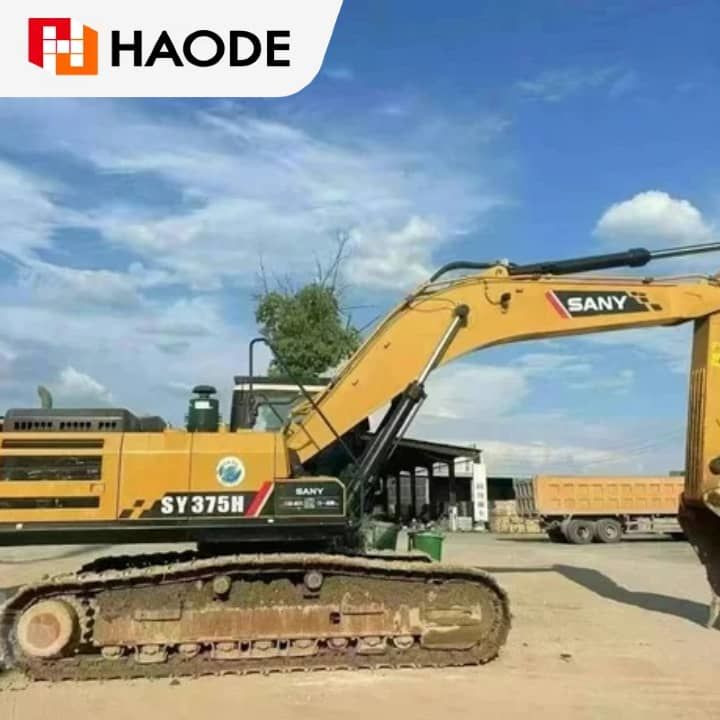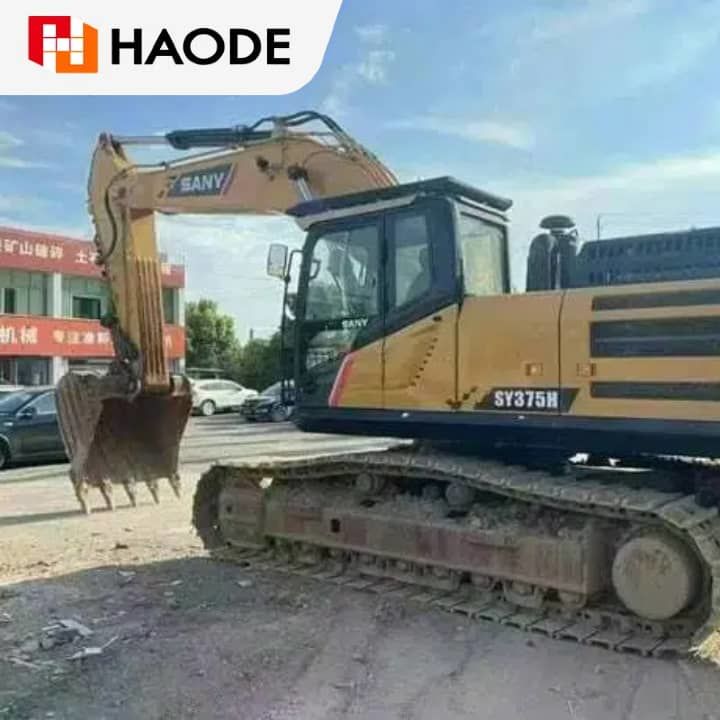25
2025
-
06
Backhoe vs Excavator: What’s the Difference? How to Choose the Right Equipment?
Category:
【Summary description】Backhoes and excavators have their own advantages and are suitable for different operating scenarios. Understanding the characteristics of the equipment and the needs of your own projects is the premise for making wise decisions. If you focus on efficiency and operating depth, an excavator will be the best choice; if you pursue flexibility and versatility and have a limited budget, a backhoe is more attractive.
In the fields of construction sites, municipal construction, agricultural construction, mining operations, etc., backhoes and excavators are very common construction machinery. Although they can both be used for tasks such as excavation, handling, and loading, they are often suitable for different working conditions due to differences in structural design and function. This article will comprehensively analyze "backhoe vs. excavator" to help you understand their essential differences and make reasonable choices based on project requirements.
What is an excavator?
An excavator is an engineering machine that uses a hydraulic system to drive a working device for earthwork operations. It is usually composed of a boom, a dipper, a bucket, a rotating platform, and a crawler or wheeled chassis. Its operating method is to cut, lift, rotate,and unload materials through a bucket to complete the excavation, loading, or transportation of earthwork.

Main parts included:
Upper body: including cab, engine, hydraulic system, and control system
Lower body: equipped with tracks or tires to provide walking ability
Boom and bucket: provide control of excavation depth and angle
Bucket: in direct contact with soil and rocks, used for cutting and loading
Slewing platform: enables the equipment to rotate 360 degrees, improving operational flexibility
Types:
Crawler excavator: suitable for uneven ground such as mountains and mining areas, with strong stability
Wheel excavator: suitable for urban roads, convenient transfer
Mini excavator: compact structure, suitable for indoor or narrow spaces
Long arm excavator: suitable for scenes requiring long-distance operations, such as river dredging
About what an excavator is used for, it has a wide range of uses, covering infrastructure, road excavation, water conservancy projects, house demolition, mining operations, and other fields.
What is a backhoe?
A backhoe is a multi-purpose engineering vehicle that combines front-end loading and rear-end excavation functions. Its structure is usually based on a wheeled tractor chassis, with a loading bucket at the front and a mechanical arm with a backhoe bucket at the rear, which can achieve a variety of operations such as bulldozing, loading, trenching, and lifting.
Main parts included:
Front-end loader: used for bulldozing and material handling
Rear-end backhoe arm: mainly used for trenching and underground operations
Cockpit: rotatable seat for easy operation of the front and rear ends
Wheeled chassis: provides good road driving ability
Types:
Backhoes are usually classified as light, medium, and heavy by weight, and there are also variants equipped with four-wheel drive or telescopic arms to meet different working conditions.

Backhoe vs Excavator
1.Size and design
Excavators: usually larger in size, more stable in structure, with booms at the front, and the cab can rotate 360 degrees, optimized for excavation tasks.
Backhoes: Relatively small in size, with a loading bucket at the front and an excavation arm at the rear. The cab cannot rotate in all directions and is more inclined to multi-functional use.
2.Mobility
Excavators:
Tracked design adapts to rugged terrain but has a slow driving speed, suitable for on-site operations or low-frequency transfers; wheeled models can be driven on the road but have slightly poor stability.
Backhoes:
With a wheeled chassis, it can be legally driven on the road and has flexible transfers, which are particularly suitable for projects that require frequent changes at construction sites.
3.Functionality
Excavators:
Focus on high-intensity and high-efficiency excavation tasks, with greater operating depth and power, suitable for medium and large engineering operations.
Backhoes:
With diverse functions, it can be used as a small loader or for basic excavation operations, suitable for small projects or multi-functional construction scenarios with limited budgets.
4.Range of motion
Excavators:
With full 360-degree rotation capability and flexible operation, it is suitable for projects with limited space or multi-angle excavation.
Backhoes:
The rotation range of the rear excavator arm is usually within 180 degrees, and the operating range is small, but it performs well in simple trenches or shallow excavation.
5.Preferred usage scenarios
Excavators:
They are the first choice in heavy earthwork, mining, large-scale demolition, and other scenarios with high requirements for operation efficiency and depth.
Backhoes:
They are more practical in small construction environments with high multi-function and flexibility requirements, such as farm construction, urban road maintenance, and pipeline laying.
6.Cost
Excavators:
How much does an excavator cost? The price of a new machine usually ranges from hundreds of thousands to millions of RMB, depending on tonnage, brand and configuration. For start-ups or small and medium-sized enterprises, a used excavator for sale is a very cost-effective choice. Using second-hand models not only reduces initial investment, but also relieves financial pressure while ensuring the quality of work.
Backhoes:
The purchase cost is generally lower than that of excavators, and maintenance is simple, suitable for users with limited budgets or multi-task requirements.
Factors to consider when selecting the right machine for your project
When choosing a backhoe or an excavator, the following factors should be considered comprehensively:
Project scale and complexity of working conditions: For large earthwork, deep excavation, or harsh environments, excavators are preferred.
Site environment: Backhoes are more convenient in small urban areas and workplaces that require frequent movement.
Functional requirements: If you want one device to complete multiple tasks, such as loading and trenching, backhoes are more cost-effective.
Budget considerations: If the budget is sufficient, you can buy a new machine. If the funds are limited, it is recommended to consider used excavators for sale or small backhoes.
Operator proficiency: Excavators require professional operating skills, and the versatility of backhoes is more friendly to novices.
Summary
Backhoes and excavators have their own advantages and are suitable for different operating scenarios. Understanding the characteristics of the equipment and the needs of your own projects is the premise for making wise decisions. If you focus on efficiency and operating depth, an excavator will be the best choice; if you pursue flexibility and versatility and have a limited budget, a backhoe is more attractive. Especially when there are a large number of used excavators for sale on the market, it is also a smart choice to find a second-hand model with high cost performance through reasonable screening and technical evaluation. I hope this article can provide valuable reference for your purchasing and construction decisions.
FAQ
Q: How much does an excavator cost?
A: Depending on the brand, size, and features, a new excavator can cost from $50,000 to over $500,000. Pre-owned units vary widely in price based on usage history and condition.
Q: What are the precautions for buying a used excavator for sale?
A: When purchasing, you should pay attention to checking the machine hours, whether the hydraulic system is leaking, whether the rotation is smooth, and try to choose equipment sources with maintenance records and good after-sales service.
Q: What is the average lifespan of an excavator?
A: The average lifespan of an excavator typically ranges from 8,000 to 10,000 operating hours, depending on usage intensity, maintenance frequency, and operating environment. Well-maintained machines can last beyond 12,000 hours, while those used under harsh conditions without proper care may wear out sooner.
Q: What precautions should you take when using an excavator?
A: When operating an excavator, ensure the operator is properly trained and familiar with the controls. Conduct daily inspections for fluid levels, loose parts, and potential leaks. Avoid overloading or working on unstable ground. Always follow safety protocols, wear protective gear, and be aware of your surroundings to prevent accidents.
related content

